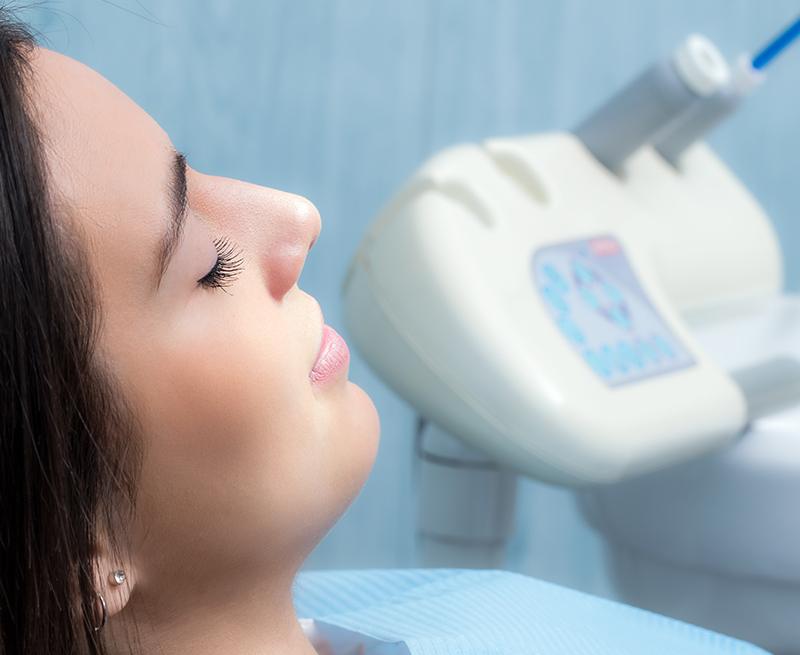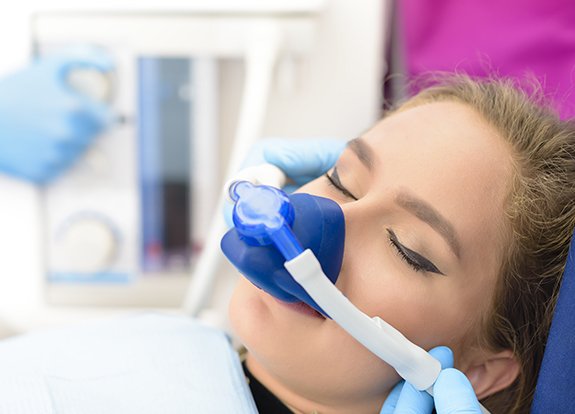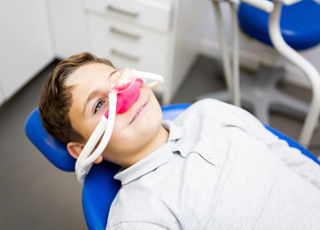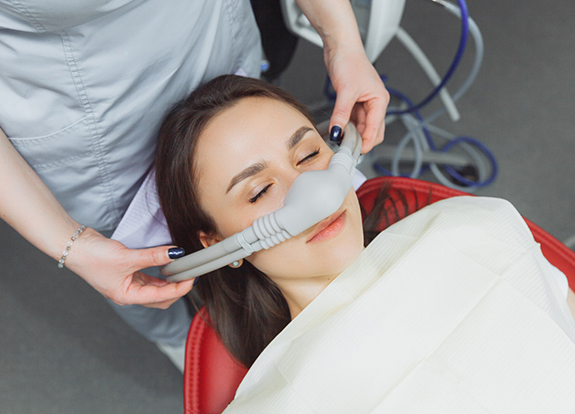Sedation Dentistry – Grand Prairie, TX
Feel More Relaxed in the Treatment Chair
Do you feel anxious, nervous, or worried at the thought of visiting a dentist for treatment or a regular checkup and cleaning? You may be surprised to know that countless adults suffer from dental anxiety that keeps them from scheduling necessary appointments. Dr. Desai can provide nitrous oxide sedation to help you feel more at ease while you receive the care you require. To request sedation dentistry from our Grand Prairie, TX dentist at your next appointment, be sure to contact our dental office beforehand and let us know!

Why Choose Care 32 Dental of Grand Prairie for Sedation Dentistry?
-
Safe Sedation for Both
Children & Adults -
Can Be Used for
Any Procedure -
Your Comfort is
Our Highest Priority
Nitrous Oxide Sedation

Be honest… Have you been avoiding scheduling an appointment, even though you have a suspicion that something is wrong? Do you dread your routine checkups and cleanings because you struggle with dental anxiety? Whatever the case may be, we have good news: we offer dental nitrous oxide in Grand Prairie! If you are interested in learning more about it, including who is generally a good candidate, simply read on or get in touch with a helpful member of our team.
Who is a Good Candidate for Nitrous Oxide?

Nitrous oxide can help both children and adults alike, and it has been used for decades to help patients struggling with dental anxiety, a sensitive gag reflex, and head/neck/jaw pain in the treatment chair. It’s also a great option for those who need more extensive care, like multiple tooth extractions. Ultimately, if you are interested in this calming solution, the best thing to do is schedule a consultation with us. That way, we can learn about your dental history, discuss any allergies you have, and determine if you’re a good candidate.
How Does Nitrous Oxide Work?

Nitrous oxide is a fast-acting sedation that is administered once you get to our dental office. Once you’ve settled comfortably into the treatment chair, we’ll place a small mask over your nose that will allow you to breathe in the colorless, odorless gas. Within a few minutes, you’ll feel a wave of tingling relaxation go through your body, helping you feel comfortable and at ease. When you’re ready to begin, we’ll work quickly and thoroughly to make sure that you don’t have to stay in the treatment chair for any longer than necessary. We’ll also check in with you throughout your visit, ensuring you remain completely free of anxiety from start to finish.
Aftercare for Nitrous Oxide

After the procedure is complete, we’ll remove the mask. Within three to five minutes, the effects will dissipate, and you’ll feel completely normal. For that reason, you don’t need to arrange for someone to drive you home or request the rest of the day off work. Instead, you’ll be able to go about your day as you typically would. Just make sure to abide by any aftercare instructions related to the care you received, like rinsing with warm saltwater periodically, sticking to only extremely soft foods, or taking OTC pain medication as directed.
Sedation Dentistry FAQs

Will I feel any pain with dental sedation?
To be honest, you shouldn’t feel any pain with dental sedation. Its sedatives don’t cause discomfort as a side effect. Instead, the sedation process will ensure your treatment is smooth and comfy.
Take our office’s nitrous oxide sedation, for example. So-called “laughing gas” won’t lead to aches or soreness. On the contrary, it should make you feel giddy or euphoric. Plus, it’ll suppress your body’s ability to register pain. Even if a procedure does irritate you, you’ll only sense a slight pressure.
Also, note the specific treatment you get. Your dentist may numb your mouth as part of it. That way, the affected area won’t hurt as things proceed.
Can dental sedation make you sick?
In some cases, dental sedation can make you sick. However, this outcome is very uncommon. It seldom happens due to the steps dentists take.
For starters, nitrous oxide sedation only has mild effects. It shouldn’t destabilize your body enough to cause nausea. The only exception is when you’ve inhaled the gas for a long time. Even then, though, actual sickness is a rare occurrence.
Of course, you can further reduce the nausea risk. One approach is to not eat for a few hours before your treatment. (If you struggle to skip meals, you may want to book a morning visit.)
Does dental sedation put you to sleep?
Sometimes, people will say dental sedation is a form of “sleep dentistry.” In reality, though, the service doesn’t put you to sleep. It simply keeps you calm during the treatment process.
True, sedation can feel like being put to sleep. You might feel woozy or lightheaded as the sedative works on your body. Even so, you should be awake throughout the procedure. That alertness lets the dentist give you instructions as needed.
Even if a sedative makes you feel sleepy, you needn’t worry. Our dental team will gently nudge you awake. From there, you can keep track of how your care is going.
What are the risks of sedation dentistry?
To be clear, sedation dentistry is usually safe for most patients. (Dentists wouldn’t practice it otherwise.) That said, it may present risks for some people.
You see, sedation may cause problems for those with health issues. That fact especially applies to patients with sleep apnea, as well as anyone taking certain medications. Such people may suffer from disordered breathing due to a sedative.
Given this fact, talk to your dentist before trying sedation dentistry. They can review your health history to see if a sedative suits you. Should they find a good one, the only effects you might face are nausea or a headache.
